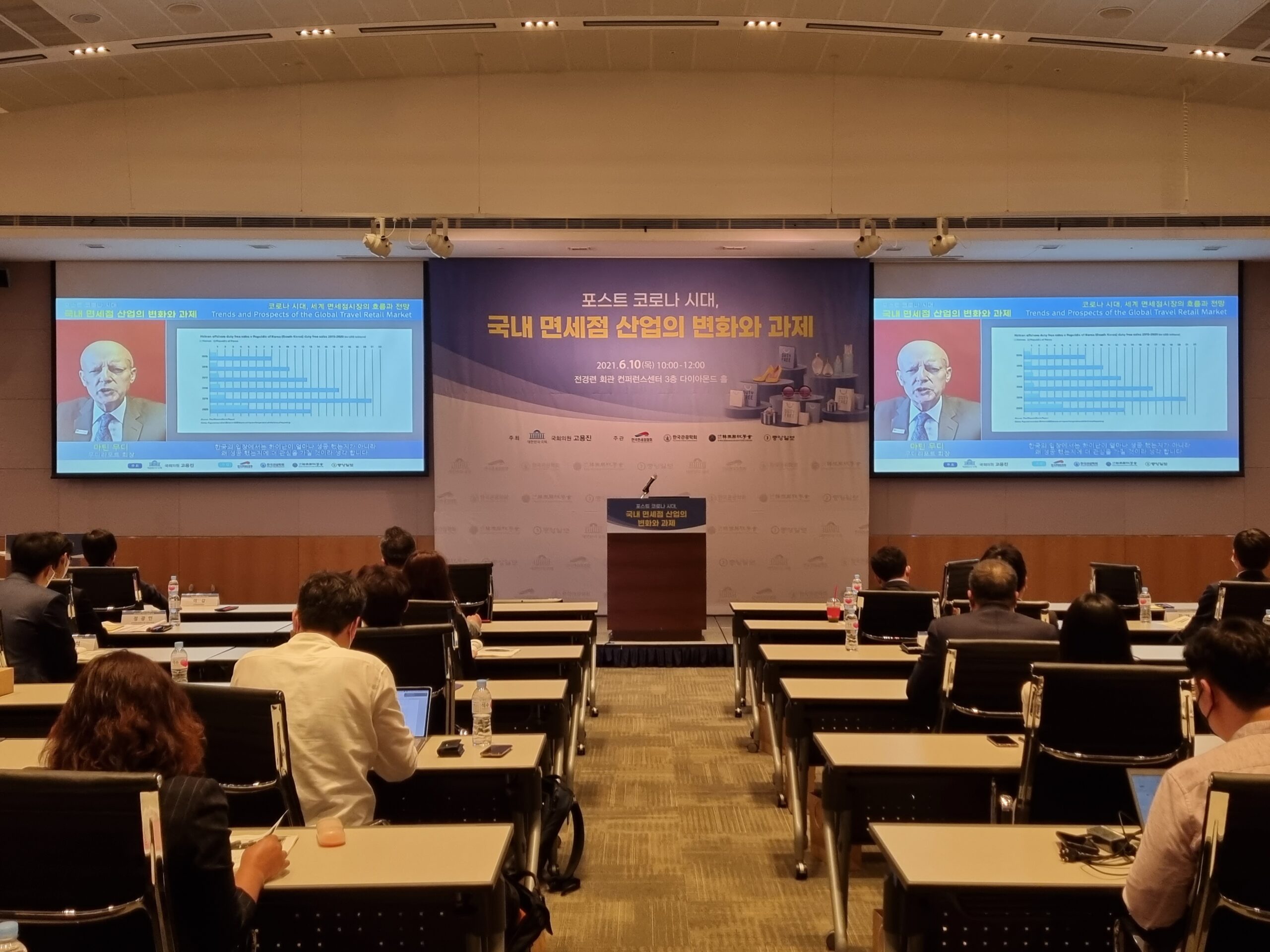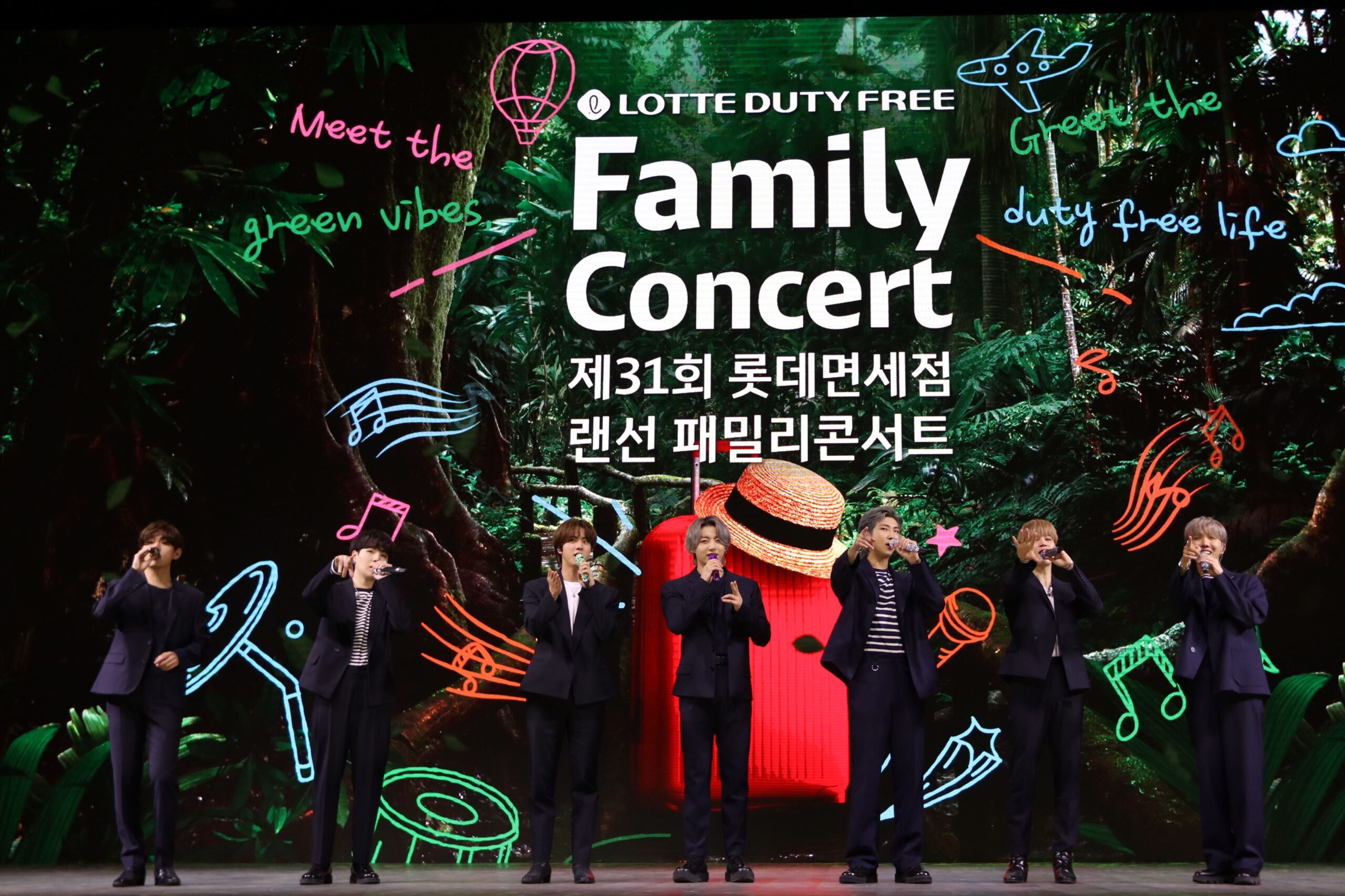SOUTH KOREA. The Moodie Davitt Report Founder & Chairman Martin Moodie delivered a video address today to a top-level duty free seminar held at the National Assembly in Seoul. Moodie said that while the local industry needed more government support if it was to maintain its global leadership, it also had to lessen its reliance on daigou traders reselling into China.
The event, coordinated by the Korea Duty Free Shop Association, was themed ‘The Post-Corona Era – Changes and Challenges of the Korean Duty Free Shop Industry.’
The event was hosted by Representative Ko Yong-jin of the ruling Democratic Party of Korea.

Speakers, panellists and moderators included Kim Jae-ho, Professor of Tourism Management at Inha Technical College; Howon University Vice President Jang Byung-kwon; Kim Hyung-gon, Professor of Tourism Management, Sejong University; Lee Byung-cheol, Professor of Tourism Events, Kyonggi University; and Jeong Kwang-min of the Korea Culture and Tourism Institute.
They were joined by Deputy Research Fellow, Lee Soo-gi, Head of JoongAng Ilbo’s distribution team; Lee Ho-seop, Head of the Customs system at the Ministry of Strategy and Finance; and Kim Jae-sik, Director of the bonded industry support section of the Korea Customs Service.
Moodie began his address by saying he had a particular interest in and knowledge of the Korean duty free market, having visited the country almost every year from 1990 until pandemic-scourged 2020. “I have seen the travel retail industry in the Republic grow from small beginnings to become the number one market in the world,” he said.
“It’s been a remarkable achievement and one that has brought much benefit to Korea’s tourism sector, to Korean producers (both big and small) and to Korean culture – both ancient and modern. Not just a world-leading industry in terms of scale but world-leading in terms of quality.
“Korea both as a tourism destination and as a duty free destination cannot remain what we call in English a one-trick pony”

 “I have tracked the many triumphant moments in Korean duty free history and of course witnessed the rise and rise of Lotte Duty Free to become the world number two travel retailer in The Moodie Davitt Report’s annual Top 25 Travel Retailers ranking with The Shilla Duty Free ranking 3 and even the relative newcomer Shinesegae Duty Free ranking number 8 in our rankings based on 2019, pre-COVID sales.
“I have tracked the many triumphant moments in Korean duty free history and of course witnessed the rise and rise of Lotte Duty Free to become the world number two travel retailer in The Moodie Davitt Report’s annual Top 25 Travel Retailers ranking with The Shilla Duty Free ranking 3 and even the relative newcomer Shinesegae Duty Free ranking number 8 in our rankings based on 2019, pre-COVID sales.
“I have documented the evolution of the game-changing Hallyu marketing concept down the years from its very early days in Star Avenue at Lotte’s Myeong-dong store to the extraordinary star power of today’s Family Concerts.
“I have also tracked Korean Duty Free’s leadership in promoting K-beauty to the world; and in its unrivalled heritage of digital innovation and excellence.”

But Moodie warned that the Korean duty free industry is at a critical point as it faces up to the challenges of the COVID-19 pandemic and the rise of China’s home-grown offshore duty free industry.
“Our channel relies on many factors to deliver the sustained growth it has generated over recent years but the greatest of all is passenger density,” he said, referring to the collapse in passenger traffic all over the world.

However, such an environment also offers opportunities for those who are strong enough, fast enough and flexible enough and that is certainly the case with Korean travel retail companies, he contended, provided they seize the moment.
“You have financial solidity – not something that can be said for all your global competitors; a history of innovation and of pioneering; an unrivalled expertise in digital commerce and communication; an intimate knowledge of the Chinese and Korean consumer; some superb physical real estate; a devoted and loyal public following; and of course the greatest star power on the planet.

“In my view, Korean Duty Free needs to draw on its heritage – the history of one of the great travel retail industry pioneers. In recent years you have been able to rely on passenger traffic momentum; rising Chinese spend; disparity between China domestic pricing and Korean duty free; and of course a huge and thriving daigou business.
“But I think the Korean industry also needs help. Because China’s duty free industry is getting plenty of help from central and regional government and it is changing the dynamics of Asian travel retail.”
Moodie highlighted the extraordinary growth of Hainan’s offshore duty free sector, saying it was the result of visionary pro-business, pro-consumer policies. He showed a chart (below) showing the narrowing of the gap between the Korean duty free market and that of Hainan, noting that the Hainan authorities believe that 2022 sales will hit US$15 billion with a rise to US$45 billion by 2025. Korean duty free represented a US$21.3 billion market in 2019 but it slumped to around US$13.2 billion last year.

“Hainan is certainly here to stay. But the big question – and one that I know everyone in Korean travel retail asks constantly – is how much of that Chinese shopping will be repatriated abroad again, to places such as Korea, Thailand, Vietnam, Singapore and the special administrative regions of Hong Kong and Macau, once the Chinese can travel freely,” he noted.
“From a Korean perspective, I think the interesting angle is not simply how successful Hainan is but why. The whole principle of offshore duty free shopping in Hainan is a cornerstone of a ‘mega-trend’ to maximise Chinese consumption at home and repatriate Chinese shopping spend from abroad.
“However, as much as the Chinese domestic market will grow and as much as the authorities will attempt to persuade Chinese nationals to travel and shop within China, I have every confidence that the Chinese will continue to travel abroad in great numbers in the future. Don’t forget that only around 14% of China’s 1.4 billion population have passports.
“But Korea both as a tourism destination and as a duty free destination cannot remain what we call in English a one-trick pony. You must diversify your tourism and shopping attractions to other nationalities and much investment and imagination must be poured into that.
“I have visited Korea many times, I have toured beautiful Jeju, lived in vibrant Busan and experienced the non-stop excitement of Seoul and I am entranced by your culture, your cuisine, your natural and man-made wonders. As a country you must spread the word far and wide about all these attractions.”
Tipping point
Moodie emphasised how critical the next stage of development will be in the Republic. “Overall then, I think we are at a tipping point for the global and Korean duty free industry. The next steps here in Korea must be the right ones. Duty free and travel retail is a vital creator of employment, of tourism, and of economic wealth.
“Industry must collaborate with government to ensure that all the hard work of the past 41 years since Lotte Duty Free opened its first downtown shop in Seoul is not thrown away.”
Moodie also cited other changes to the industry landscape. “The concession model that underpins, or many would argue undermines, the airport retail industry, will come under more intense scrutiny than ever more in Korea and elsewhere. How the new model or models look will have a huge say in appetite for risk by retailers and brands going forward.

“The world has grown used to shopping online and has liked what it has seen and the travel retail channel will accelerate in this area. I am confident that Korea will continue to lead the way and in that context Lotte Duty Free and its Korean peers are indeed best in class in terms of digital commerce and communication.
“What of the airlines’ role? Lotte Duty Free has tied up with various Korean carriers in recent times on its ‘flights to nowhere’. This proves that collaboration between retailer and airline can work. Why not more of such partnerships, especially once flights can actually fly somewhere and not nowhere?


“CSR – in a world gone wrong, the focus on a better, cleaner, greener, more sustainable planet among your target consumers and those that are emerging, will grow ever stronger. In a sector such as travel retail you are practically centre stage in terms of environmental and social issues. The need to show leadership is acute and it is good to see Lotte Duty Free leading the way in this regard.

“Now is the moment for Korean duty free to focus on the very qualities that made it great in the first place; the qualities that saw it rise from ground zero to become the world’s biggest market in just a few decades; the qualities that have seen it champion local products and local culture more than any other country’s duty free industry in the world.
“Now is the moment for all Korean stakeholders to work together with government as never before to protect and to grow what has been built.”
Moodie concluded with a well-known Korean saying – 고생 끝에 낙이 온다. “Loosely translated it means ‘At the end of hardship comes happiness. I wish Korea and Korean duty free much happiness in the future after all its recent hardships.”








